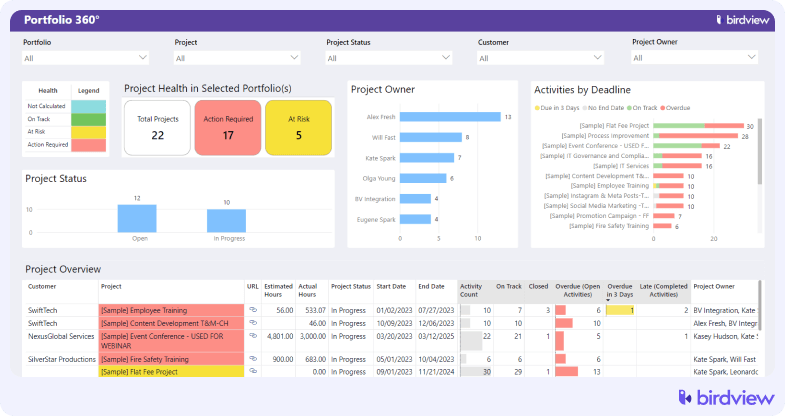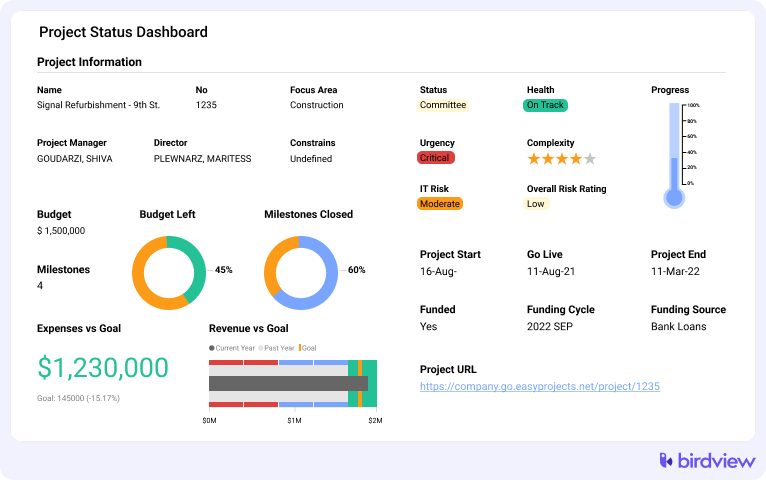Choosing a Professional Services Automation (PSA) platform is a strategic decision that will redefine your organization’s operational efficiency. You‘ve likely seen the consequences of disconnected systems–siloed data, inaccurate forecasts, and overworked teams. The right PSA software replaces this chaos with a single source of truth, giving you the visibility and control needed to scale your business profitably.
But with so many options available, how to choose PSA software that truly fits your needs? A thorough evaluation is critical to avoid investing in a solution that fails to solve your core challenges. This PSA selection checklist, featuring 20 essential questions, is designed to guide you through the process, ensuring you select a platform that empowers your team, delights your clients, and drives financial performance.
Foundational and business alignment questions
Before diving into features, it‘s crucial to confirm that a potential PSA aligns with your core business strategy and operational model. These foundational questions ensure the software is built to solve your specific problems, both today and as you grow.
1. What are the primary business challenges we need to solve?
You should first identify your most significant operational pain points. A PSA platform is a powerful tool, but its value comes from solving specific problems like low resource utilization, inaccurate project bidding, revenue leakage, or a lack of visibility into project profitability. Documenting these challenges helps you prioritize which features matter most.
Clearly defining your problems prevents you from being distracted by features that don’t address your core needs. For example, if your main issue is resource burnout, you need a PSA with robust capacity planning and forecasting, not just basic task management. This focus ensures you select a solution that delivers a tangible return on investment.
2. Does the PSA align with our industry and service delivery model?
The ideal PSA should be tailored to the unique workflows of professional services firms. Ask vendors how their platform supports organizations like yours, whether you are an IT services provider, an engineering firm, a marketing agency, or a business consultancy. A one-size-fits-all solution rarely accommodates the complex billing and resource management needs of a service-based business.
Look for a platform that understands your world–from managing billable hours and utilization rates to tracking project-specific KPIs. A vendor with experience in your industry will provide not only the right software but also best practices for implementation and use. Birdview PSA, for instance, is purpose-built to help professional services teams manage the entire service delivery lifecycle.
3. How will the PSA support our future growth and scalability?
The platform you choose today must be able to grow with you tomorrow. Discuss the vendor‘s scalability model to understand how the system handles an increase in users, projects, and data. Can it support new service lines, multiple business units, or even global operations with different currencies and compliance requirements?
A scalable PSA avoids the costly and disruptive process of migrating to a new system in just a few years. Ensure the platform is flexible enough to adapt to your evolving processes without requiring extensive custom development. This foresight protects your investment and ensures your operational backbone remains stable as you scale.
4. Can the platform provide a single source of truth?
The ultimate goal of a PSA is to eliminate data silos by unifying project, resource, and financial information. Ask if the platform provides a truly integrated environment where data from one module–like time tracking–automatically flows into others, such as project accounting and reporting. This is fundamental to gaining a holistic view of your business health.
A unified platform ensures everyone–from project managers to the C-suite–is working with the same real-time data. Birdview PSA centralizes every aspect of service delivery, giving you a bird‘s-eye view of past performance, current work, and future demand so you can make confident, data-driven decisions.
Core functionality and features
Once you‘ve confirmed strategic alignment, it‘s time to evaluate the platform‘s core capabilities. These questions will help you determine if the software has the functional depth to manage the entire quote-to-cash cycle efficiently and profitably.
5. How robust is the project and portfolio management?
A great PSA must excel at core project management. Evaluate its ability to handle complex project planning with task dependencies, milestones, and different methodologies (like Agile or Waterfall). Does it offer visual tools like interactive Gantt charts and Kanban boards to help teams track progress and adapt to changes?
Beyond individual projects, consider its project portfolio management (PPM) capabilities. The system should allow you to group projects by client, business unit, or strategic goal, giving executives high-level visibility into overall performance and alignment with business objectives.

6. What resource management capabilities does it offer?
Effective resource management is the key to profitability in professional services. Ask vendors to demonstrate how their system provides a clear view of team capacity, availability, and utilization. Can you easily find and assign the right person to a task based on their role, skills, and availability?
Look for advanced features like demand forecasting and what-if scenario planning. A powerful resource planning software helps you anticipate future hiring needs, prevent team burnout, and ensure that your most valuable assets–your people–are deployed effectively across billable projects.
7. How does the PSA handle project accounting and financial management?
Your PSA should be the financial command center for every project. Verify that it can track project budgets, monitor actual costs against estimates in real-time, and calculate key financial metrics like profit margins. Does it support different cost and billing rates for various roles or individuals?
Strong project finance tools give you the visibility needed to keep projects profitable. The ability to monitor budget variance and other financial KPIs within the same platform where work is managed allows you to spot issues early and take corrective action before they impact your bottom line.
8. Does it support our billing and invoicing models?
Inaccurate or slow invoicing directly hurts cash flow. Confirm that the PSA supports all of your billing arrangements, including time and materials, fixed-fee, milestone-based, and retainers. The system should automate the invoicing process by pulling approved timesheets and expenses directly into client invoices.
Automating this workflow reduces administrative overhead, minimizes human error, and accelerates your quote-to-cash cycle. With its recently released Invoicing module, Birdview PSA allows you to create and send accurate, professional invoices directly from the platform, ensuring you get paid faster.
Integrations and technical fit
A PSA platform doesn’t operate in a vacuum. Its ability to connect with your existing technology stack is crucial for creating a seamless, automated workflow across your entire organization.
9. What are its integration capabilities with our CRM (e.g., Salesforce, HubSpot)?
A smooth handoff from sales to service delivery is non-negotiable. Ask if the PSA offers pre-built integrations with your CRM to automatically create new projects from closed deals. This eliminates manual data entry, reduces errors, and allows your project team to get started faster.
This integration is foundational for aligning your sales and delivery teams. By ensuring project details, client information, and SOWs are automatically synced, you can provide a seamless client onboarding experience from day one.
10. Does it integrate with our accounting software (e.g., QuickBooks, NetSuite)?
To maintain financial accuracy, your PSA must communicate seamlessly with your accounting system. Confirm that the platform can sync invoices, payments, and expense data with tools like QuickBooks, Xero, or NetSuite. This two-way flow of information ensures that both your project teams and finance department have a consistent view of financial performance.
Without this integration, your finance team is forced to manually re-enter data, creating duplicate work and increasing the risk of errors. Birdview PSA offers several key integrations to ensure your financial data remains consistent across platforms.
11. Is there an API for custom integrations?
While pre-built integrations are essential, you may have unique tools or proprietary systems that also need to connect to your PSA. Ask if the vendor provides a well-documented, open API (Application Programming Interface). An API allows your development team to build custom connections, ensuring the PSA can fit perfectly into your specific technology ecosystem.
12. What are the security, compliance, and data residency policies?
Protecting your company and client data is paramount. Inquire about the vendor‘s security protocols, including data encryption, access controls, and regular security audits. If you operate in regulated industries or specific geographic regions, confirm that the platform meets relevant compliance standards (like GDPR or SOC 2) and offers data hosting in your required location. For Canadian businesses, for example, Birdview PSA offers Canadian-based hosting to ensure data sovereignty.
User experience and adoption
The most powerful software is useless if no one uses it. These questions focus on usability, customizability, and the support systems in place to ensure successful team-wide adoption.
13. How intuitive is the user interface for different roles?
A successful PSA must be user-friendly for everyone, not just project managers. During a demo, evaluate the interface from the perspective of a team member logging time, an executive reviewing a dashboard, and a resource manager balancing workloads. A clean, intuitive design reduces the learning curve and encourages daily use.
14. Is the platform customizable to our workflows and terminology?
Your firm has unique processes and language. A rigid, inflexible system will force you to change your workflows to fit the software, causing friction and frustration. Ask if you can customize fields, workflows, templates, and even terminology to match the way your team already works. This adaptability is key to making the software feel like your own.
15. What does the onboarding and implementation process look like?
A poor implementation can doom a PSA rollout from the start. Ask for a detailed overview of the onboarding process. Who will be your point of contact? Do they offer data migration services? What is the typical timeline from purchase to go-live? A structured, hands-on implementation process is a strong indicator of a vendor’s commitment to your success.
Birdview, for example, provides comprehensive onboarding services, including dedicated implementation specialists who guide you through account setup, workflow design, and data import to ensure a smooth transition.
16. What kind of training and support is provided post-launch?
Ongoing support is just as important as the initial implementation. Clarify the vendor‘s support model: What are their standard support hours? Do they offer different tiers of support? Are training resources like a knowledge base, video tutorials, and live webinars readily available? Responsive and knowledgeable customer support ensures that minor issues don‘t become major roadblocks.
Reporting and vendor relationship
Your relationship with a PSA vendor is a long-term partnership. These final questions help you assess the platform‘s value as a strategic tool and the vendor‘s commitment to your long-term success.
17. How powerful and customizable are the reporting and BI dashboards?
The true power of a unified PSA lies in its ability to generate insights. Examine the platform‘s reporting capabilities. Can you create custom reports and dashboards for different stakeholders? Does it provide real-time analytics on key metrics like resource utilization, project profitability, and portfolio health?
Powerful Business Intelligence Dashboards transform raw data into actionable insights, enabling leaders to make strategic decisions with confidence. Birdview PSA‘s reporting engine lets you visualize performance at every level, from individual task progress to portfolio-wide financial health.

18. What is the vendor‘s product roadmap?
You are investing in a platform that needs to evolve with technology and industry trends. Ask the vendor about their product roadmap and how they prioritize new features. A forward-thinking vendor will have a clear vision for the future and a transparent process for incorporating customer feedback into their development cycle.
19. What is the total cost of ownership (TCO)?
Look beyond the initial license fee. Ask for a complete breakdown of all potential costs, including implementation fees, training packages, support plans, and any charges for additional integrations or data storage. Understanding the TCO helps you create an accurate budget and prevents unexpected expenses down the road.
20. Can we speak with current customers in our industry?
There is no better validation than speaking with a current customer. Ask the vendor for references from companies that are similar to yours in size, industry, and use case. These conversations provide unfiltered insights into the platform’s real-world performance, the vendor‘s support quality, and the overall customer experience. You can also explore published customer success stories for more immediate feedback.
How Birdview PSA provides the answers
Asking the right questions is the first step. Finding a platform that provides the right answers is the goal. Birdview PSA is designed from the ground up to address the core challenges of professional services firms by providing a single source of truth for projects, resources, and finances.
Our platform offers robust project and resource management to ensure your teams are productive and balanced. Our integrated project accounting and invoicing features streamline financial workflows to protect your margins and improve cash flow. With customizable Business Intelligence Dashboards, seamless integrations, and a dedicated onboarding team, Birdview PSA empowers you to gain the visibility and control needed to scale your business with confidence.
Ready to see how Birdview PSA can transform your service delivery?
Further reading



